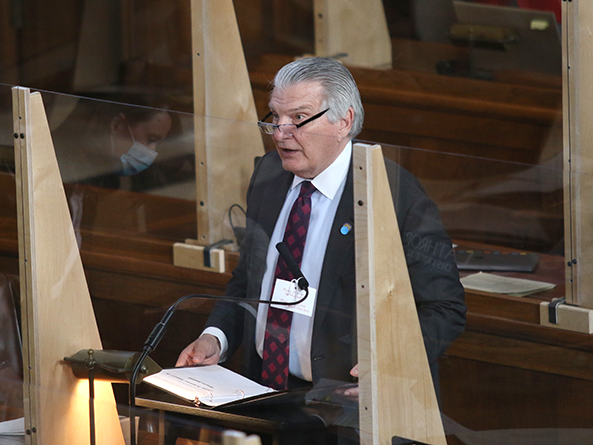State budget amended, advanced with prison funding compromise
Following discussion of several proposed changes, lawmakers gave second-round approval April 13 to the state’s $9.7 billion budget package. The state budget is structured on a two-year basis, with the budget enacted during legislative sessions held in odd-numbered years.
A compromise regarding provisions to fund the study of a new state prison was amended into two bills included in the budget package.
LB380, introduced by Speaker Mike Hilgers on behalf of the governor, is the mainline budget bill. Senators approved an amendment during general file debate to appropriate $115 million in general funds to the Nebraska Capital Construction Fund, which would be available for the Legislature to appropriate for a new state prison should one be deemed necessary in the future.
During select file debate, Lincoln Sen. Anna Wishart offered an amendment, adopted 34-1, to reduce the NCCF funding to $100 million. The other $15 million of the original amount instead would be placed into a newly created Prison Overcrowding Contingency Fund.
In addition, the amendment would provide $200,000 to contract with the University of Nebraska to study inmate classification within the state Department of Correctional Services.
“This also funds [that study] so we are prepared next year to roll up our sleeves and address prison overcrowding reform,” Wishart said.
The Prison Overcrowding Contingency Fund was created by an amendment brought by Omaha Sen. Justin Wayne to LB384, another component of the budget package. The amendment states legislative intent that dollars transferred to the fund remain sequestered until used by the Legislature to address prison overcrowding.
Omaha Sen. Steve Lathrop supported the Wayne amendment. In combination with the Wishart amendment, he said, it would allow the state to partner with UNO to find smarter ways to use state resources to ensure that inmates can obtain needed programing in a timely manner while maintaining public safety.
“This amendment demonstrates our commitment to a solution that is not just building more beds and building a new prison,” Lathrop said.
Sen. Mike Groene of North Platte expressed concern that the amendment wouldn’t solve the overcrowding problem. He said a similar study done several years ago — and the legislation that resulted from it — had the same goal but failed.
He said the main result of that attempt at prison reform was to “fill” county jails by pushing inmates down from the state level to the county level.
“I’ve heard this promise before,” Groene said.
Following the 28-0 adoption of the Wayne amendment, senators advanced LB384 to final reading by voice vote.
Several additional amendments to the mainline budget bill were considered, including a proposal from Omaha Sen. Terrell McKinney, adopted 38-0, stating legislative intent that 20 percent of any future funds appropriated to the Business Innovation Act be used for the small business investment program.
Also adopted was an amendment from La Vista Sen. John Arch meant to ensure parity in child welfare provider rates across the state. The budget package provides for a 2 percent rate increase per year over the next two fiscal years.
The Arch amendment states the intent of the Legislature that Saint Francis Ministries provide that same increase to providers in the eastern service area out of their existing contract funds. The amendment was adopted 41-0.
An attempt by Groene to strike an increase in funding to the state’s public health departments was not adopted. The provisions originally were part of LB585, sponsored by Omaha Sen. Tony Vargas, and would appropriate $1.5 million in fiscal year 2021-22 and $3 million in FY2022-23 to local public health departments.
Groene said those departments are funded adequately and that lawmakers should wait until all federal CARES Act funds have been finalized to determine if additional dollars are necessary.
Vargas opposed the amendment, saying CARES Act funds are meant to reimburse public health departments for expenditures to combat the coronavirus pandemic. The additional funding in the budget would help shore up the state’s public health “infrastructure,” he said, allowing departments to resume the work of providing preventative health care and prepare for future public health emergencies.
“This proposal was brought because CARES Act funding is one-time funding,” Vargas said. “Public health infrastructure is critical to ensuring that the next time something happens — and not just a pandemic or a virus — that our public health departments are [responding] and are prepared to do so.”
The Groene amendment failed on a 10-23 vote. An amendment offered by Omaha Sen. Machaela Cavanaugh to fully fund the state’s developmental disabilities wait list over a three-year period also failed 15-20.
Following adoption of a technical amendment, senators advanced LB380 to final reading by voice vote.
Other components of the budget package also were given second-round approval.
LB379, advanced 42-0, would make adjustments to funding for state operations, aid and construction programs in the current fiscal year ending June 30, 2021. LB381, advanced 45-0, would provide for the $12,000 annual salaries of Nebraska’s 49 state senators.
Advanced to final reading by voice vote were:
LB382, which would fund salaries and benefits for judges and constitutional officers;
LB383, which would appropriate funds for capital construction;
LB385, which would make a number of fund transfers to and from the state’s Cash Reserve Fund; and
LB666, which would provide for payment of claims against the state and agency write-offs for uncollectable debts.


